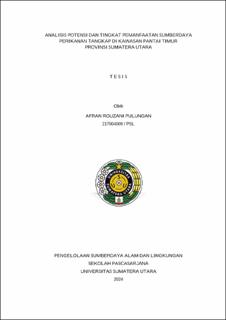| dc.description.abstract | Fisheries management focused on utilizing fisheries resources to improve the welfare of fishing communities has led to overexploitation of certain fish resources on the Eastern Coast of North Sumatera. This has resulted in a depletion of some fish species, which in turn has affected the income of fisherman. This research was conducted in Medan, Deli Serdang, and Serdang Bedagai with the objectives of (1) evaluating the potential and utilization level of large pelagic, small pelagic, and demersal fish resources; (2) analyzing the social and economic conditions of fishing communities; and (3) developing strategies for capture fisheries management. The study used the surplus production model analysis to assesst the potential and utilization level of fish resources, the EAFM (Ecosystem Approach to Fisheries Management) framewoer for social and economic aspects, and SWOT analysis to determine management strategies. The findings indicate that the exploitation of large pelagic, small pelagic, and demersal fish has led overfishing.Meanwhile, the social and economic conditions are category is good, meaning that the management and utilization of fish resources have positively impacted the social and economic conditions of fishermen. However, effort are still needed to improve household fishing income and address fishing conflict. Base on the analysis, the appropriate strategy to enhance capture fisheries management in the three research locations is the Strenght-Thread (S-T) strategy. This strategy aims to mitigate external threats by optimizing existing strengths. Efforts to achieve this include improving the quality and certification of fishery products to attract international markets and building regional cooperation with governments and international organizations to support sustainability. | en_US |


